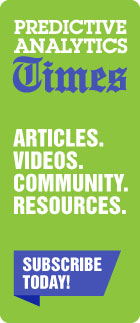Conference Day 1: Monday, September 28, 2015 • All Sessions will take place in Waterfront 2
Registration & Networking Breakfast
8:30-8:35am
Conference Founder Remarks
 Eric Siegel
Eric SiegelFounding Chair
Predictive Analytics World
Conference Chair Welcome
Keynote
Predictive Analytics
A Unicorn for Health Transformation?
From hand hygiene to polio to diabetes, the most effective public health interventions are typically preventative policies that help stop a crisis before it starts. But, predicting the next health crisis has historically been a challenge, and most interventions that are reactive rather than proactive. Thanks to predictive analytics, we are piloting new ways to predict population health challenges before they occur so that we can intervene to stop the challenges or take steps to reduce the impact.
Predictive analytics can be used to leverage seemingly unrelated data to predict who is most susceptible to birth complications or chronic diseases or where and when a virulent outbreak is most likely to occur. With this information, data becomes actionable. Predictive analytics has the potential to transform both care delivery, intervention deployment, and how resources are allocated, thereby improving and transforming health. Harvard researchers showed Twitter could be used to understand the lives of those suffering from insomnia. Imagine using Twitter, air quality data, and claims data to predict the flow of asthma sufferers to the Emergency Department.
In this session, you will begin to understand how predictive analytics can help our nation achieve the threefold aim of changing public health policy, systems, and environments for the benefit of all.
[ Top of this page ] [ Agenda overview ]

Diamond Sponsor Presentation
How to Make Predictive Modeling Successful for Better Healthcare
Healthcare is different from other domains where predictive analytics have been successfully implemented, and transformed industries. Healthcare applications typically involve data that are particularly personal and sensitive, and results and predictions can significantly change patients' quality of life. Therefore, the planning and implementation of predictive analytics in health care must take a broader view beyond technical requirements and specifications, to include considerations around transparency, documentation, security, accountability, to name a few. This presentation will provide an overview of these challenges, and suggest successful solutions that have emerged.
 Thomas Hill, Ph.D.
Thomas Hill, Ph.D.Executive Director Analytics, Dell Software Group
Dell Statistica Software, Information Management Group
Exhibits & Morning Coffee Break
Predicting Risk for Future Problems
Case Study: ActiveHealth
Financial Analytics or Clinical Analytics: Which is Better
Session description coming soon.
[ Top of this page ] [ Agenda overview ]
Managing Parkinson's Disease
Case Study: University of Rochester Medical Center
Tackling Parkinson's via Predictive Analytics
There are no proven therapies that can delay, stop, or reverse the clinical or neuropathological progression of Parkinson's disease. Factors responsible for the heterogeneity of the disease are not well understood and therefore not taken into account when designing clinical trials. Learn how the University of Rochester partnered with solution partners LPA and IBM to develop predictive analytic models to quantify and predict Parkinson's disease progression.
[ Top of this page ] [ Agenda overview ]
Lunch in the Exhibit Hall
1:30-2:15pm
Keynote
Turning Big Data into Better Care
Dr. Dulin is the Chief Clinical Officer for Analytics and Outcomes Research at Carolinas Healthcare System in Charlotte, NC where he has helped to create a team of over 130 team members dedicated to using data/analytics to continuously transform care delivery and turn data into actionable information at the point of care. The objectives for this presentation will include: (1) describing how to implement a health analytics function within a healthcare provider / integrated health system; (2) describe the application of data/analytics to drive population health and predict utilization; (3) describe the application of predictive models to impact acute care readmissions; and (4) the application of data and health IT to improve asthma management.
The discussion will include the need to move data/analytics competency within healthcare from the current state (massive investments in EMR systems; rapidly increasing amounts of data; and minimal ability to use data to improve healthcare delivery at population or individual level) to a future state (integrated healthcare data across the continuum, data governance allows patients to control their data, and data is used to Identify Best Practices, Drive Population Health, and Personalize Healthcare delivery.
 Michael Dulin
Michael DulinChief Clinical Officer for Analytics and Outcomes Research
Carolinas Healthcare System
 2:20-2:30pm
2:20-2:30pm
Gold Sponsor Presentation
Enabling a Data-Driven Culture in Healthcare with Predictive Analytics
Predictive analytics are critical to finding new and innovative approaches for many of the challenges in healthcare � from better understanding and managing risk to patients' health to improving the bottom-line. While it is tempting to get lost in technical details about the algorithms and data under the hood, this session will discuss the advanced analytics capabilities that are having the most impact on shifting the culture and enabling a data-driven approach to population health management:
- Right-Timed Feedback
- Personalized and Individualized Care
- Actionable Insights
Preventing Readmissions
Case Study: OSF Healthcare
Preventing Readmissions and Reducing Costs with Predictive Analytics
OSF Healthcare System internally developed and deployed an industry leading Readmission Risk Model which effectively segments the daily inpatient population into four risk categories. Attendees will learn about the construction, validation and deployment throughout our integrated healthcare system. They will also hear the successes and lessons learned from OSF Healthcare's first production level predictive modeling project. Since deploying this model, OSF Healthcare System has identified previously utilized interventions which vary in effectiveness by patient risk level as well as significant annual cost savings and avoidance possibilities, all while continuing to monitor and validate production level model performance.
Data Legal Issues
Addressing Legal Barriers to Data Usage
This presentation will discuss the common hurdles arising from the use of data in the health care. The attendees will hear about state and federal law that will bind their clients as well as the service providers themselves. I'll highlight the industry trends and some tips to efficiently addressing these issues before they stall or destroy a project.
[ Top of this page ] [ Agenda overview ]
Exhibits & Afternoon Break
Utilizing a Data Strategy
Case Study: Massey Cancer Center
Utilizing a Data Strategy to drive the Analytics Program at Massey Cancer Center
Hear a case study from the Massey Cancer Center on utilizing a data strategy to drive their analytics program; example outcomes include gathering the data needed to make the case for creating, sustaining and expanding palliative care services. Many healthcare organizations struggle with palliative care. By using data, palliative care programs can grow and advance. These case studies will highlight using analytics to improve outcomes, improve care delivery, and reduce costs. We will provide key insights and lessons learned from laying the groundwork for using analytics to improve cancer and palliative care from success stories.
 Brian Cassel, PhD
Brian Cassel, PhDAsst. Professor, Hematology/Oncology & Palliative Care, Asst. Director, Cancer Informatics Core
Massey Cancer Center
[ Top of this page ] [ Agenda overview ]
Crowdsourcing in Clinical Trial Design
Case Study: Pfizer
Crowdsourcing Predictive Analytics to Enhance Clinical Trial Design
As part of Pfizer's open innovation initiative, we have been experimenting with different techniques to develop algorithms to solve tough analytic questions. Here we access the collective knowledge of the "crowd" to develop innovative and novel solutions to analytical questions associated with "big data" including patient level medical data. We will share a case study where we have crowdsourced predictive models to identify patients who are likely to have progressive disease symptoms. We will share the pros and cons of our approach and outline situations in which crowdsourcing may be an alternative approach to other more traditional activities.
Networking Reception
[ Top of this page ] [ Agenda overview ]
Conference Day 2: Tuesday, September 29, 2015 • All Sessions will take place in Waterfront 2
Registration & Networking Breakfast
Conference Chair Welcome
Special Plenary Session
Top Five Technical Tricks to Try when Trapped
There's no better source for tricks of the analytics trade than Dr. John Elder, the established industry leader renowned as an acclaimed training workshop instructor and author -- and well-known for his "Top 10 Data Mining Mistakes" and advanced methods like Target Shuffling. In this special plenary session, Dr. Elder, who is the CEO & Founder of Elder Research, North America's largest pure play consultancy in predictive analytics, will cover his Top Five methods for boosting your practice beyond barriers and gaining stronger results.
Also sign up for Dr. John Elder's one-day workshop, The Best and the Worst of Predictive Analytics: Predictive Modeling Methods and Common Data Mining Mistakes.
[ Top of this page ] [ Agenda overview ]
Proactive Care Management
Case Study: St. Joseph Healthcare
Improving Care Coordination and Reducing Readmissions
Using Real Time Predictive Analytics
Through the Maine Health Information Exchange, hospitals and healthcare organizations use real time predictive risk scores within their daily work flows to target high risk patients for proactive care management. At St. Joseph Healthcare in Bangor, ME, each inpatient admission and emergency room visit patient receive a risk score at the time of admission. The automated risk score algorithms take into account the patient's history of disease, utilization, test results, and socioeconomic status to provide accurate real time scores. The real time scores allow clinicians to start the post discharge care management upon admission.
Exhibits & Morning Coffee Break
Increasing Lab Effectiveness
Case Study: Washington University, St. Louis Children's Hospital
Predictive Analytics in Lab Utilization � Decreasing Costs of Laboratory Testing While Increasing Diagnostic Yield
Laboratory testing can impose a substantial financial burden on both the patient and the hospital performing the testing. This is particularly true with the advent of costly genetic testing that is poorly reimbursed by insurance and medicaid. In this study we discuss the use of predictive analytics in medicine to optimize testing cost effectiveness and diagnostic yield. By predicting the best test to order and the when the wrong test is being ordered, we can intervene to avoid unnecessary testing. Implementation of these models have the potential to reduce costs and improve medical care.
Lunch in the Exhibit Hall
Keynote
Small Data, Big Impact: Using Small Data to Fuel,
Personalize, Sustain and Study Health Behavior
Consider a new kind of cloud-based app that would create a picture of an individual's life over time by continuously, securely, and privately analyzing the digital traces they generate 24x7. The social networks, search engines, mobile operators, online games, and e-commerce sites that they access every hour of most every day extensively use these digital traces to tailor ser-vice offerings, improve system performance, and target advertisements. These diverse and messy, but highly personalized, data can be analyzed to draw powerful inferences about an in-dividual, and for that individual. Use of applications that are fueled by these traces could en-hance, and even transform, our experiences as patients, family members, and caregivers. This talk will discuss precedents for small data in mobile health, and the opportunities and challenges of broadening the scope of small data capture, storage, and use.
 Deborah Estrin, Ph.D.
Deborah Estrin, Ph.D.Professor, Computer Science, Professor, Healthcare Policy & Research, Founder, Co-Founder
Cornell Tech, WCMC, Jacobs Technion-Cornell Institute, Open mHealth
[ Top of this page ] [ Agenda overview ]
Vendor Elevator Pitches


Expert Panel
Exploring the Limits of Personal Data Usage for Analytic Modeling in Healthcare
Analytics has led to many impressive advances in population and precision healthcare. And, as data science professionals advance in the world of healthcare analytics, the desire for more and different types of data grows. The value that can be gained from more personal and specific information is resulting in interest in patient information that goes well beyond what is typically available to the clinician. Is purchased consumer data from public records, store loyalty transactions, and credit card purchases fair game for health care modeling if it leads to better personal health or population health? If so, where else might researchers find useful personal information? This panel will explore the current uses of personal information and what the limits for use might be. Join our expert panel � physician, researcher, attorney, academic -- as they engage these important questions.
 Deborah Estrin, Ph.D.
Deborah Estrin, Ph.D.Professor, Computer Science, Professor, Healthcare Policy & Research, Founder, Co-Founder
Cornell Tech, WCMC, Jacobs Technion-Cornell Institute, Open mHealth
 Michael Dulin
Michael DulinChief Clinical Officer for Analytics and Outcomes Research
Carolinas Healthcare System
[ Top of this page ] [ Agenda overview ]
Exhibits & Afternoon Break
Identifying Fraud
Fraud Risk Scoring Combining Cost and Quality Models
DentaQuest describes a holistic approach to Fraud, Waste and Abuse (FWA) that expands upon traditional predictors and adapts in a flexible, scalable way to evolving business and clinical practices. By designing analytics to feed into a spectrum of cost and quality management workflows and multiple intervention channels, DentaQuest's FWA targeting models support both formal, legalistic channels of fraud recovery and lower intensity, network management-focused channels of waste and abuse prevention, reduction and recovery. DentaQuest's holistic application of FWA modeling to prevention, early detection and early intervention, as well as to acute interventions, mirrors lessons learned in healthcare delivery.
Population Health Management and Staffing Optimization
Case Study: NorthShore University HealthSystem
Predictive Analytics Applications to Populations Health Management and Staffing Optimization
Applications of predictive analytics to population health management, cost containment and staffing optimization are discussed based on NorthShore HealthSystem experience. Data quality, modeling techniques and practical lessons learned are presented based on the implementation of the presented algorithms. Suggested recommendations for organizing and carrying out predictive analytic modeling in a health care organization are provided from a practitioner's perspective.
Big Data Analytics Meetup: Embed Analytics Everywhere
Redefining the Economics of Analytics
Becoming data-driven requires analytics to be embedded throughout the organization in different functional areas and different operational processes. But how do you provide more and more people with the ability to run any analytics on any data anywhere� without breaking the bank? In this session, you'll see real-world examples of how Dell embeds analytics across processes and operations to drive innovation and redefine the economics of analytics. After a short presentation, we'd like to offer the opportunity to speak one-on-one with subject matter experts and network with peers to gain a better understanding of how embedding analytics enables faster innovation and improves collaboration between data scientists, business analysts, and business stakeholders-- while simultaneously reducing on-going costs.
Click here for more details and to confirm your attendance.
 Thomas Hill, Ph.D.
Thomas Hill, Ph.D.Executive Director Analytics, Dell Software Group
Dell Statistica Software, Information Management Group








































